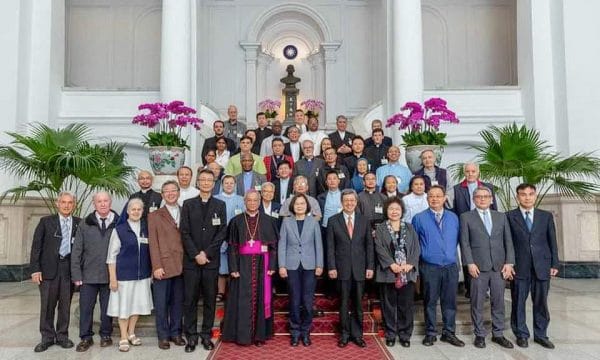
TAIPEI (UCAN): Taiwan’s president, Tsai Ing-wen, praised foreign missionaries and local clergy for their long service in helping the disadvantaged on the island.
At an October 31 meeting with 80 members of the Church including priests, religious sisters, foreign missionaries and representatives of local Churches, Tsai thanked the them for taking care of the Taiwanese people, saying it is now Taiwan’s turn to take care of them.
About 170 foreign missionaries among the senior clergy in Taiwan have received special benefits, allowances and long-term care services under the Mackay Programme, she told the gathering.
Named after Dr. George Leslie Mackay, a Canadian Presbyterian missionary who helped build hospitals and schools, and served the island’s poor and marginalised in the late 19th century, the programme, which was established in 2011, aims to provide long-term care for foreigners in Taiwan.
“Many foreign missionaries who have served long stints in Taiwan now regard Taiwan as their homeland,” said Tsai, adding that they are “truly Taiwanese.” She said the Nationality Act, amended in 2016, provides a channel for senior foreign missionaries who wish to become Taiwanese citizens to do so.
Tsai noted that foreign missionaries, who began arriving Taiwan in the 19th century, have contributed in founding schools, hospitals and many important social welfare organisations, spending the best years of their lives helping Taiwanese society develop.
Four missionaries—Father Yves Moal from France, Father Jean-Claude Fournier from Switzerland, Sister Maryta Laumann from Germany, and Sister Teresita Enriques from the Philippines—have received Taiwanese national identity cards.
They were praised for their respective services for the physically disadvantaged, the indigenous, the textile industry and helping patients with dementia.
“You are a driving force that has continuously helped make a better Taiwan.” Tsai said.
The meeting, also attended by vice-president, Chen Jianen, who is Catholic, was seen as an exceptional occasion in terms of the group size and the number of national clergy and Church members.
Chen Lei-Shih, chairperson of the National Council of the Lay Apostolate, the Catholic National Association, was invited for the first time to the Presidential Palace and greeted by Tsai.
James Li, a Catholic from Taipei, said on November 6 that while he was happy to see the government affirming the contribution of missionaries and the Church to society, he was concerned about the timing and the event’s implication for voting in the presidential election next year.
He noted that Tsai’s strong stance on legitimising same-sex marriage was contrary to the Church’s position. “She did not really listen to the voice of the Church. How important is the Church’s voice for her?” he asked.
Others at the meeting included Archbishop John Hung Shan-chuan and Father Otfried Chan, the president and secretary-general of the Chinese Regional Bishops’ Conference, respectively.










